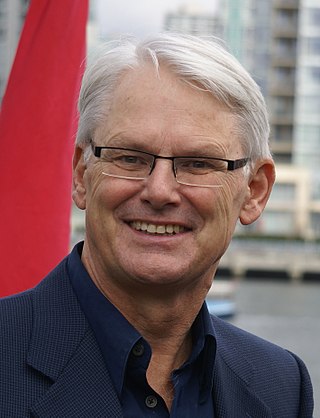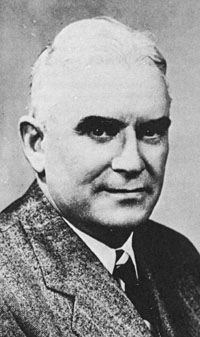BC United (BCU), formerly known as the British Columbia Liberal Party or BC Liberals, is a provincial political party in British Columbia, Canada. The party has been described as conservative, neoliberal, and being on the centre-right of the left–right political spectrum. The party commonly describes itself as a "free enterprise coalition" and draws support from members of both the federal Liberal and Conservative parties. Since the 1990s, BC United has been the main centre-right opposition to the centre-left New Democratic Party (NDP). Once affiliated with the Liberal Party of Canada, the British Columbia Liberal Party became independent in 1987. The party changed its name to BC United on April 12, 2023.
The New Democratic Party of British Columbia is a provincial political party in British Columbia, Canada. The party espouses social democracy and sits on the centre-left of the political spectrum. The NDP is one of the two major parties in British Columbia (BC); since the 1990s, its rival is the centre-right BC United. The BC NDP is formally affiliated with the federal New Democratic Party and serves as its provincial branch.
William Andrew Cecil Bennett was a Canadian politician who served as the 25th premier of British Columbia from 1952 to 1972. With just over 20 years in office, Bennett remains the longest-serving premier in British Columbia history. He was a member of the Social Credit Party (Socreds).

David Barrett was a politician and social worker in British Columbia, Canada. He was the 26th premier of British Columbia from 1972 to 1975.

The British Columbia Social Credit Party, whose members are known as Socreds, was the governing provincial political party of British Columbia, Canada, for all but three years between the 1952 provincial election and the 1991 election. For four decades, the party dominated the British Columbian political scene, with the only break occurring between the 1972 and 1975 elections when the British Columbia New Democratic Party governed.
Grace Mary McCarthy, OC, OBC, LLD, DTech, FRAIC (Hon.) was a Canadian politician and florist in British Columbia. A high-ranking member of the Social Credit Party of British Columbia, she was largely responsible for rebuilding that party after its defeat in the 1972 provincial election.

The Alberta New Democratic Party, commonly shortened to Alberta NDP, is a social-democratic political party in Alberta, Canada. It is the provincial Alberta affiliate of the federal New Democratic Party, and the successor to the Alberta section of the Co-operative Commonwealth Federation and the even earlier Alberta wing of the Canadian Labour Party and the United Farmers of Alberta. From the mid-1980s to 2004, the party abbreviated its name as the "New Democrats" (ND).

The 1996 British Columbia general election was the 36th provincial election in the Province of British Columbia, Canada. It was held to elect members of the Legislative Assembly of British Columbia. The election was called on April 30, 1996, and held on May 28, 1996. Voter turnout was 59.1 per cent of all eligible voters. The election is notable for producing a "false-winner" outcome, rewarding a party that got second in the popular vote with a majority government.

The 1991 British Columbia general election was the 35th provincial election in the Province of British Columbia, Canada. It was held to elect members of the Legislative Assembly of British Columbia. The election was called on September 19, 1991, and held on October 17, 1991. The incumbent Social Credit Party of British Columbia, which had been beset by scandals during Bill Vander Zalm's only term as premier, was defeated by the New Democratic Party of Mike Harcourt. Liberal Party leader Gordon Wilson surprised observers by leading his party to winning one-third of the votes cast, and forming the official opposition in the legislature. The new legislature met for the first time on March 17, 1992.
Gordon Wilson is a former provincial politician in British Columbia, Canada. He served as leader of the Liberal Party of BC from 1987–1993, leader and founder of the Progressive Democratic Alliance from 1993–1999, before joining the NDP where he served in the provincial cabinet. He also ran as a candidate in the 2000 BC New Democratic Party leadership race. During the 2013 British Columbia provincial election, Wilson endorsed Liberal Premier Christy Clark for re-election over the NDP's Adrian Dix.

The 2005 British Columbia general election was held on May 17, 2005, to elect members of the Legislative Assembly (MLAs) of the Province of British Columbia (BC), Canada. The British Columbia Liberal Party formed the government of the province prior to this general election under the leadership of Premier Gordon Campbell. The main opposition was the British Columbia New Democratic Party, whose electoral representation was reduced to two MLAs in the previous provincial election in 2001.

The 1986 British Columbia general election was the 34th general election in the Province of British Columbia, Canada. It was held to elect members of the Legislative Assembly of British Columbia. The sitting Social Credit government was re-elected.

The 1979 British Columbia general election was the 32nd general election in the Province of British Columbia, Canada. It was held to elect members of the Legislative Assembly of British Columbia. The election was called on April 3, 1979. The election was held on May 10, 1979, and the new legislature met for the first time on June 6, 1979.

The 1975 British Columbia general election was the 31st general election in the Province of British Columbia, Canada. It was held to elect members of the Legislative Assembly of British Columbia. The election was called on November 3, 1975, and held on December 11, 1975. The new legislature met for the first time on March 17, 1976.

The 1952 British Columbia general election was the 23rd general election in the Canadian province of British Columbia. It was held to elect members of the Legislative Assembly of British Columbia, alongside a plebiscite on daylight saving time and liquor. The election was called on April 10, 1952, and held on June 12, 1952. The new legislature met for the first time on February 3, 1953.
The Politics of British Columbia involve not only the governance of British Columbia, Canada, and the various political factions that have held or vied for legislative power, but also a number of experiments or attempts at political and electoral reform.

Robert Martin Strachan was a trade unionist and politician. He was the longest serving Leader of the Opposition in British Columbia history.
The 29th Legislative Assembly of British Columbia sat from 1970 to 1972. The members were elected in the British Columbia general election held in August 1969. The Social Credit Party led by W. A. C. Bennett formed the government. The New Democratic Party (NDP) led by Dave Barrett formed the official opposition.
The 30th Legislative Assembly of British Columbia sat from 1972 to 1975. The members were elected in the British Columbia general election held in August 1972. The New Democratic Party (NDP) led by Dave Barrett formed the government. The Social Credit Party led by W. A. C. Bennett formed the official opposition. Bill Bennett was elected Social Credit party leader in November 1973 after his father resigned his seat in the assembly in June 1973.
The 33rd Legislative Assembly of British Columbia sat from 1983 to 1986. The members were elected in the British Columbia general election held in May 1983. The Social Credit Party led by Bill Bennett formed the government. After Bennett retired in 1986, Bill Vander Zalm became Premier. The New Democratic Party (NDP) led by Dave Barrett formed the official opposition. After Barrett resigned his seat in 1984, Bob Skelly became party leader.










